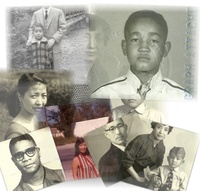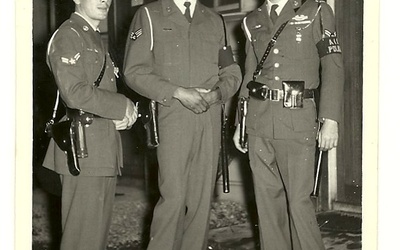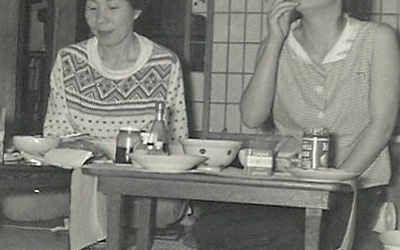「水の子の夢、水の子の夢」より抜粋

これは記憶の人類学であり、日記と回想録であり、創造的なノンフィクション作品です。思い出した記憶、両親やその他の親戚、友人との会話、日記の記述、夢日記とポストコロニアル批評分析を組み合わせています。
計画中の三部作の最初の本、 「水の子の夢」は、母と息子の関係を通して語られる、人種関係、ジェンダー、戦争トラウマの社会学的苦悩と遺産に焦点を当てています。特に母親の垣波清子に焦点を当てています。これは、黒人と日本人の混血の人々とその両親、第二次世界大戦後の米国の太平洋の軍事化と、黒人とアジアのアイデンティティ、ジェンダー関係、自由への意志を通じたその複雑な遺産に関心のあるすべての人のための作品です。
読者への注意
この作品に登場するすべての出来事や出来事は、夢も含め、実際の出来事であり、回想や瞑想、日記、会話、インタビューなどの記憶から構成および/または記録されています。記憶や日記は回想して使用していますが、記憶そのものの記述には自由を取り入れ、過去の出来事の特定の詳細を思い出せない、または完全に知らないという代わりに、特定の口調や描写を使用しています。人物の身元を保護するため、一部の名前は変更されています。記憶や会話に基づかない出来事、事実、コメントへの言及には注意を払っています。
私は民族誌研究の学者であり、人格、人種、性別、社会経済的階級、性的指向、特定の地域、歴史上の時代、歴史との特定の関係、両親や友人、場所、考え方や記憶の仕方など、私を特定するすべてのカテゴリーと同様に、この本で読者の皆さんに提供する短編小説は、私のこれらすべての部分を、すべてを包み隠さず表現しています。そこには沈黙があります。読者が考え、疑問を持ち、感じ、思い出し、支配的な規範、したがって人生の安易なカテゴリーを越えられるようにする空間があります。多くの場合、これらのカテゴリーは私たちを隔て、恐れ、怒り、非現実的にします。国境を越えたホームレス生活、断絶と並置、そしてさまざまな風景に点在する継続的な遺産を通して語られる、断片的な想起としての記憶こそが、平和、社会正義、そして故郷に対する異なる想像力に向けた対話を開くために読者の皆さんに残すものです。
著者からの注記:
編集者募集: 現在、ジャンルを超えた執筆や国境を越えた執筆、異文化間の執筆に精通した編集者を探しています。あなたやあなたの知り合いで、この仕事を引き受けていただける方がいらっしゃいましたら、ぜひご連絡ください。
また、出版社を探しています。この最初の作品に関連して、マルチメディア プロジェクトや他の本があり、興味がある出版社と協力したいと思っています。
これらの質問やその他の質問については、 fredrickdc@gmail.comまでご連絡ください。
このシリーズのストーリー
Part 6: Constant King [2 of 2]
2011年8月5日 • フレデリック・クロイド
Read “Part 6: Constant King [1 of 2]” >>How, then, are manhood, fatherhood and hierarchies constructed in this? It’s not just one thing. You’re too young to remember, I think. One time I was giving you a bath. It was at our house in Ōme. Your Dad came to Japan to see how we were doing, a year after he was here for your birth. We were still waiting for the American government to let us marry. Until then, your …
Part 6: Constant King [1 of 2]
2011年7月29日 • フレデリック・クロイド
Read “Part 5: Monsters” >>The Constant King 1964Mama and Dad and myself are at the dinner table. It was really the first full year ever, that Dad sat at the dinner table with Mama and I for a meal or two. In the past, he had been out of the country where Mama and me lived. When I was born it wasn’t good that he was with us, according to the military. So he was in America and Korea. In …
Part 5: Monsters
2011年7月22日 • フレデリック・クロイド
Read “Part 4: Neighbors/Next Door” >>Monsters 1950 Shōwa Year 25化け物 昭和25年From a leaflet from the U.S. armed forces made available to the occupation soldiers during the strongest period of attempting to implement the anti-fraternization policy which tried to discourage relations between Japanese women and occupation personnel: “[Japanese women] have been taught to hate you. They do as their men tell them, and many of them have been told to kill you. Sex is one of the oldest and most effective …
Part 4: Neighbors/Next door
2011年7月15日 • フレデリック・クロイド
Read “Part 3: Watermelon Seeds [2 of 2]” >>Neighbors/Next door, Mama around 1940となり、昭和15年ごろ“These expressions are extremely crude and regional, and have a rustic air; middle-class Tokyo residents would laugh at their provincial quaintness.” —Dorinne Kondo1 We were obviously not 江戸っ子 Edokko.2 People reminded us that we were foreign and special, even though we were Japanese. Older sister spoke louder than other girls around and liked to be around the girls who were always in trouble at school and were …
Part 3: Watermelon Seeds [2 of 2]
2011年7月8日 • フレデリック・クロイド
Read “Part 3: Watermelon Seeds [1 of 2]” >>I am still an only-child. But now my only child identity was not the same as just a moment before. I was born alone but because a sister died. Fragments of unknowns become apparent. I then felt relieved. Some things fell into a certain logical reasoning—or perhaps it was a certain logic that offered comfort. I was an only child, but now I reasoned that a protector-twin had been watching over me, …
Part 3: Watermelon Seeds [1 of 2]
2011年7月1日 • フレデリック・クロイド
Read “Part 2: The Waters [2 of 2]” >>Watermelon seeds, 1964 Shōwa Year 39スイカの種、1964年 昭和39年“One of the remarkable features of this group is that it seems that all the war children receives[sic] a stigma, whether the father was an enemy soldier or an allied…We have to understand that this stigma often is associated with the status of the mother.” —From: The War Children of the World1 Lovers—a Japanese man and the French woman, speak: He: You saw nothing in Hiroshima. …

![Thumbnail for Part 6: Constant King [2 of 2]](https://devmedia.discovernikkei.org/cache/db/9a/db9a76bfa18f9490e494f486f64512db.jpg)
![Thumbnail for Part 6: Constant King [1 of 2]](https://devmedia.discovernikkei.org/cache/62/17/6217bb1959862992c0fa06102b0fa6d6.jpg)


![Thumbnail for Part 3: Watermelon Seeds [2 of 2]](https://devmedia.discovernikkei.org/cache/9d/f0/9df0d7061a12355f20bb8ba7a7ebc6ab.jpg)
![Thumbnail for Part 3: Watermelon Seeds [1 of 2]](https://devmedia.discovernikkei.org/cache/4a/05/4a056fdbaaa352626f4f66cc41cba99d.jpg)

